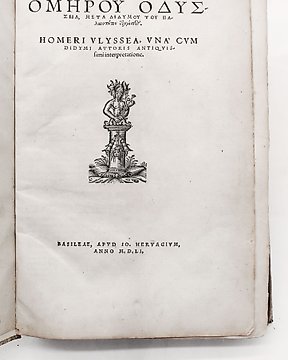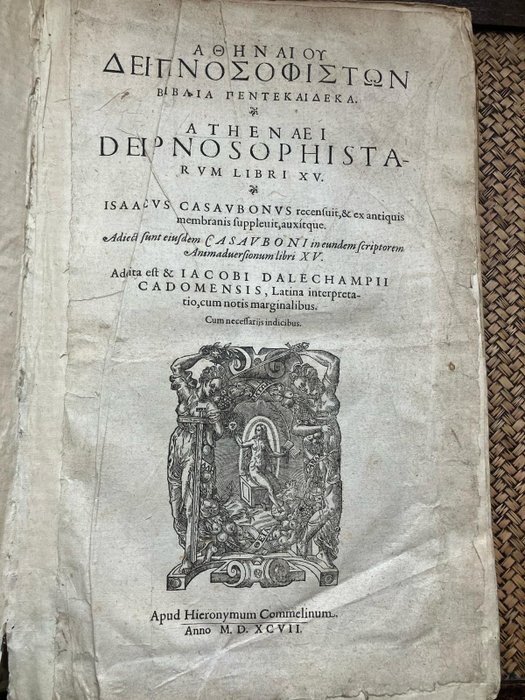
Omero - ὍΜΗΡΟΣ ὈΔΎΣΣΕΙΑ [Odissea] - 1551
Nr. 82659131

Nr. 82659131

ATHĒNAIU || DEIPNOSOPHISTŌN || BIBLIA PENTEKAIDEKA.|| ATHENAEI || DEIPNOSOPHISTA-||RVM LIBRI XV.|| ISAACVS CASAVBONVS recensuit, & ex antiquis || membranis suppleuit, auxitque.|| Adiecti sunt eiusdem CASAVBONI in eundem scriptorem || Animaduersionum libri XV.|| Addita est & IACOBI DALECHAMPII || CADOMENSIS, Latina interpreta-||tio, cum notis marginalibus.|| ... ||
The only extant work of Athenaeus of Naucratis, Sophists at Dinner has been described as an "encyclopaedia under the disguise of a dialogue" (John Edwin Sandys, A History of Classical Scholarship, Vol. I, 1903., p. 330): containing countless anecdotes from ancient authors on food, wine, and dining customs, this is an invaluable source of information on ancient daily life.
The title Deipnosophistae can be literally translated as "men learned in the arts of the banquet". The work is an account of a series of banquets held at the house of the Roman pontiff Larentius, attended by major exponents of all disciplines - including Democritus, Galen, Ulpian and Plutarch - who discuss extensively of grammar, poetry, rhetoric, music, philosophy, and medicine. They debate at length a wide spectrum of topics, notably food, wine and cookery (the work is an important source of Greek, Persian, Roman and Sicilian recipes, many of which would have been lost), homosexuality (an unusually candid portrait for the time), sexual mores in general, health, music and philology.
"Food and drink, cups and cookery, stories of famous banquets, scandalous anecdotes, specimens of ancient riddles and drinking songs and disquisitions on instruments of music are only part of the miscellaneous fare which is here provided. We are indebted to the quotations in Athenaeus for our knowledge of passages from about 700 ancient writers who would otherwise be unknown to us" (ibid.). Also included is the text of the earliest known recipe by a named author (Mithaecus) in any language, and what may be considered to be the first patents (i.e. exclusive right granted to an inventor).
Athenaeus of Naucratis was a Greco-Egyptian writing in the early part of the 3rd century AD. I
The Deipnosophistae is an important source of recipes in classical Greek. It quotes the original text of one recipe from the lost cookbook by Mithaecus, the oldest in Greek and the oldest recipe by a named author in any language. Other authors quoted for their recipes include Glaucus of Locri, Dionysius, Epaenetus, Hegesippus of Tarentum, Erasistratus, Diocles of Carystus, Timachidas of Rhodes, Philistion of Locri, Euthydemus of Athens, Chrysippus of Tyana, Paxamus and Harpocration of Mende. It also describes in detail the meal and festivities at the wedding feast of Caranos.
In addition to its main focuses, the text offers an unusually clear portrait of homosexuality in late Hellenism. Books XII-XIII holds a wealth of information for studies of homosexuality in Roman Greece. It is subject to a broader discussion that includes Alcibiades, Charmides, Autolycus, Pausanias and Sophocles. Furthermore, numerous books and now lost plays on the subject are mentioned, including the dramatists Diphilus, Cratinus, Aeschylus, and Sophocles and the philosopher Heraclides of Pontus.
The English polymath Sir Thomas Browne noted in his encyclopaedia Pseudodoxia Epidemica:
Athenæus, a delectable Author, very various, and justly stiled by Casaubon, Græcorum Plinius. There is extant of his, a famous Piece, under the name of Deipnosophista, or Coena Sapientum, containing the Discourse of many learned men, at a Feast provided by Laurentius. It is a laborious Collection out of many Authors, and some whereof are mentioned no where else. It containeth strange and singular relations, not without some spice or sprinkling of all Learning. The Author was probably a better Grammarian then Philosopher, dealing but hardly with Aristotle and Plato, and betrayeth himself much in his Chapter De Curiositate Aristotelis. In brief, he is an Author of excellent use, and may with discretion be read unto great advantage: and hath therefore well deserved the Comments of Casaubon and Dalecampius.
Browne's interest in Athenaeus reflects a revived interest in the Banquet of the Learned amongst scholars following the publication of the Deipnosophistae in 1596 by the Classical scholar Isaac Casaubon. Browne was also the author of a Latin essay on Athenaeus. Jacques Daléchamps (1513, Caen – 1588) was a French botanist and physician. When the scholar Isaac Casaubon first established the Greek text of the recently rediscovered Deipnosophistae, it was printed alongside a Latin translation by Daléchamps.
Here is this important work, in parallel text in Greek and Latin, woodcut printer's device on title-page. There are extensive notes, often of a medical nature, by Dalechamps.
Bound in original lap vellum with remains of ties. The pages are uniformly toned; the title page has been relaid; the text is complete, with an excellent index of 30 pages. One page in the index has a small marginal tear that has been restored; there are some ancient restorations to the binding. This is a generally clean and very handsome copy of an important and large book. There is some occasional spotting and some old damp areolas in the margins.
Reference: VD16 A 4005 (first edition assigned to Heidelberg, as here)
Hogyan vásárolhatok a Catawiki-n?
1. Fedezzen fel valami különlegeset
2. Tegye meg a legmagasabb licitet
3. Fizessen a biztonságos és védett rendszert használva